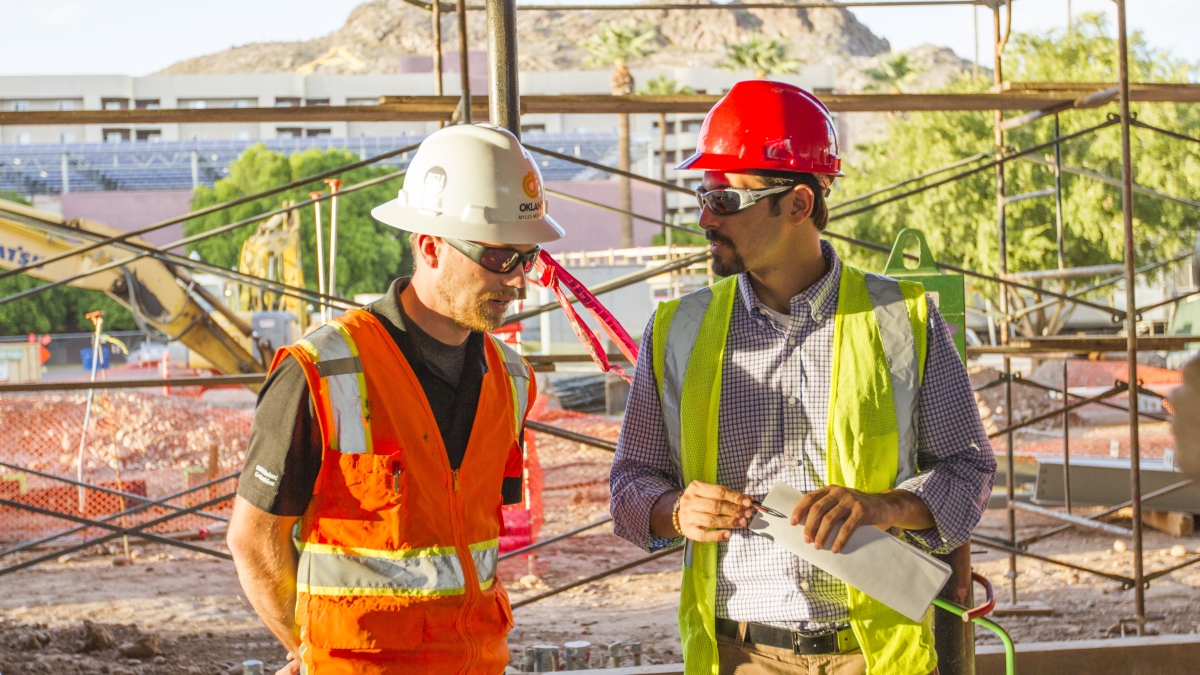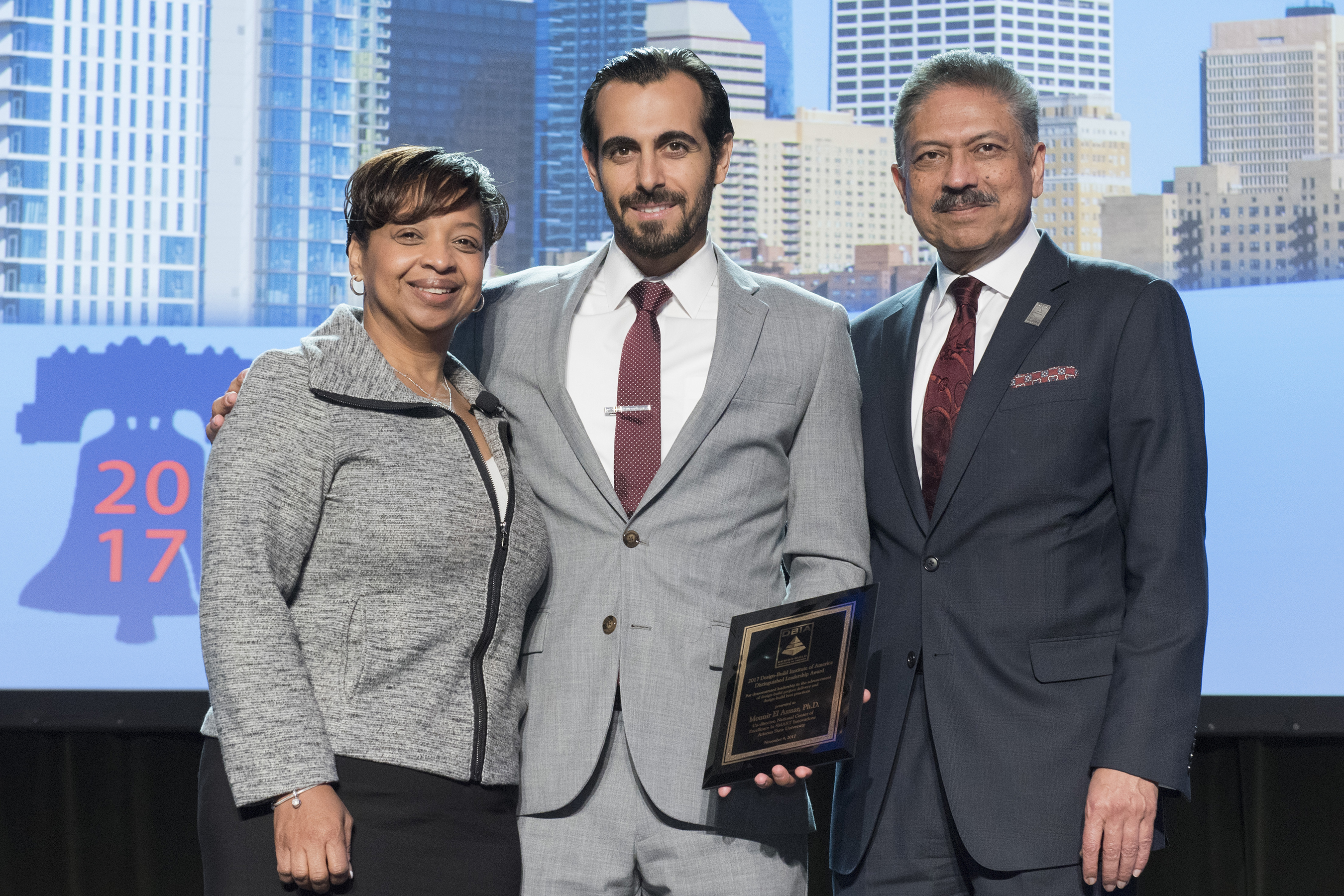A better way to build

Mounir El Asmar (at right) has been recognized by a national construction industry organization as a leader in research that is advancing innovative methods for managing engineering and construction projects. He is pictured with Myles Morton, a 2013 graduate of the Del E. Webb School of Construction at Arizona State University. Photo by: Jessica Hochreiter/ASU
Mounir El Asmar’s work is having a growing impact on construction industry practices as he continues to push the boundaries of innovation in construction engineering and management.
His research accomplishments and the value they are bringing to multiple areas of the construction field were recognized recently when the faculty member in Arizona State University’s Ira A. Fulton Schools of Engineering was awarded the 2017 national Distinguished Leadership Award from the Design Build Institute of America at the organization’s annual conference in Philadelphia.
The award acknowledges El Asmar’s contributions and leadership in advancing the Design-Build project delivery approach that focuses on fostering close collaborative working relationships between project owners, designers and builders.
His meticulous and extensive analyses of data from numerous large engineering and construction projects over several years have been providing verification of the superior performance and effectiveness associated with the use of the Design-Build approach and other novel project delivery methods.
An alternative to the conventional siloed project delivery method, Design-Build stipulates that an integrated team work under a single contract with a project owner to provide both design and construction services simultaneously.
The goal is to integrate the roles of designer and builder to ensure a unified work flow and create more opportunities for innovation from project conception to completion.
“It keeps everyone working together from start to finish, allowing stakeholders to benefit from the experiences of one another, instead of separating architects, engineers and constructors into silos,” El Asmar explained. “We have measured the benefits of this approach outperforming traditional linear methods, in both reducing project costs and schedule, and most recently resulting in an improved quality of the built facilities.”
His research, teaching, journal publications and conference presentations on innovative project delivery strategies have earned him multiple awards, including the Construction Industry Institute 2014 Distinguished Professor Award and the American Society of Civil Engineers 2015 Thomas Fitch Rowland Prize.
Since then he has stepped up the pace on exploring the benefits of new project delivery methods.
Applying research to wide range of engineering and education endeavors
In nominating El Asmar for the DBIA leadership award, colleague Wylie Bearup, a professor of practice in the construction management program in the Fulton Schools’ Del E. Webb School of Construction and former city engineer and streets transportation director for the city of Phoenix, noted the broad variety of interdisciplinary endeavors to which El Asmar has been applying his expertise.
Bearup — a DBIA Leadership Award recipient in 2009 — pointed to El Asmar’s leadership on three U.S. Department of Transportation-funded research projects to explore and improve the effectiveness of project delivery approaches, plus an ongoing high-visibility project with colleague Keith Molenaar at the University of Colorado Boulder to develop new Federal Highway Administration guidebooks that will provide guidance to state departments of transportation across the country.
El Asmar has developed a graduate course focusing on those methods and practices that is attracting growing numbers of students. In addition, he teaches versions of his course for industry leaders and government agencies both locally and globally, ranging from classes for the Maricopa County Department of Transportation in Arizona to instructing municipal engineers in Abu Dhabi, the capital city of the United Arab Emirates.
He and his team are also working with the U.S. Department of Transportation on a project that is collecting and analyzing data from state departments of transportation as part of another in-depth study designed to measure the long-term performance impacts of the Design-Build method over the life cycles of highways.
Lisa Washington (left), executive director and CEO of the Design-Build Institute of America, and the organization’s chairman Praful Kulkarni (right), presented Fulton Schools faculty member Mounir El Asmar the Distinguished Leadership Award at the DBIA annual national conference. Photo courtesy of Design-Build Institute of America.
El Asmar is the research coordinator for the National Academies’ Transportation Research Board project delivery systems committee, and is collaborating — along with Samuel Ariaratnam, a professor in the School of Sustainable Engineering and the Built Environment, one of the Fulton Schools — with the Water Research Foundation to evaluate the Design-Build method’s performance on water and wastewater projects, as well as to develop a decision-support tool to help water utilities select and deploy the most effective method for their projects.
“The main goal is to improve the performance of the built environment and empower the stakeholders delivering these projects,” including the construction of buildings, highways, industrial projects, pipelines, water treatment systems and other infrastructure systems, said El Asmar, who is also co-director of the National Center of Excellence on SMART Innovations at ASU (SMART stands for Sustainable Materials and Renewable Technologies).
‘Creating new knowledge’ is fulfilling accomplishment
A week after accepting the DBIA award, El Asmar received the Community Service Award at the annual Arizona Pavements/Materials Conference for his significant contributions to transportation project delivery and achievement in bridging the gap between research and practice.
His work is also nominated for the Transportation Research Board’s Fred Burggraf Award, which recognizes young research leaders for advancing knowledge in the field of transportation. The award winner will be announced in January.
El Asmar is using his research findings in teaching construction management, construction engineering and civil engineering students in his classes in the School of Sustainable Engineering and the Built Environment and the Del E. Webb School of Construction.
He also founded the DBIA student chapter at ASU and has overseen its growth, and he coaches students participating in Design-Build national competitions.
His accomplishments since coming to ASU five years ago have brought an expanding list of responsibilities and commitments.
Some of the most rewarding moments, he said, stem from “creating new knowledge” with the aid of “brilliant” graduate and undergraduate students. Students assisting him in research have performed work that helped earn them 17 awards and scholarships from various government and industry organizations.
“I’m extremely honored, humbled and thrilled to receive the DBIA national award and the Arizona community service award,” El Asmar said, “and even more fulfilling is seeing my own students succeed and be recognized for their work. I’m fortunate to be working with such a talented group of students, sponsors and collaborators.”
More Science and technology

ASU-led Southwest Advanced Prototyping Hub awarded $21.3M for 2nd year of funding for microelectronics projects
The Southwest Advanced Prototyping (SWAP) Hub, led by Arizona State University, has been awarded $21.3 million in Year 2 funding…

Celebrating '20 Years of Discovery' at the Biodesign Institute
Editor’s note: The Biodesign Institute at Arizona State University wraps up its 20th anniversary with the sixth and final…

Student research supports semiconductor sustainability
As microelectronics have become an increasingly essential part of modern society, greenhouse gas emissions, which are associated…
